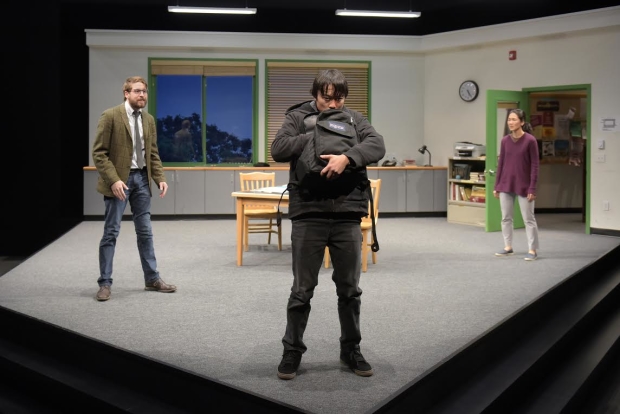Office Hour Looks at Why a Student Might Resort to Violence in Order to Connect
Julia Cho’s timely play is a reminder that compassion isn’t always easy.

(© Kevin Berne)
A creative writing teacher and her student sit in a nondescript office on campus at a minor college. In his hoodie, baseball cap, and sunglasses, the mostly silent student cuts an imposing figure, and the backpack he clutches may or may not contain a gun.
That’s the simple premise of Julia Cho’s captivating Office Hour, onstage at Berkeley Repertory Theatre’s Peet’s Theatre in a coproduction with Long Wharf Theatre. A teacher, both emboldened and terrified, is attempting to cut through the noise of life in America at this moment — the screaming debates, the toxic politics, the horrifying headlines — and connect with a troubled student who needs help before he does himself or others harm.
The interesting thing about this taut 80-minute drama is that Cho approaches the fraught issue of gun violence in our nation’s schools not with a screed or a polemic but with a writer’s deep and messy sense of exploration and revelation. It’s no mistake that every character in the play — from Gina the teacher, to Dennis the student, to Gina’s frustrated fellow teachers — is a writer of some kind.
Dennis (Daniel Chung) is the kind of writing student who makes every class he’s in a nightmare because he writes about extreme violence and deviant sexual behavior. His troubling works terrorize his teachers and the other students, and his unwillingness to talk or to shed his hat and glasses makes his very presence a threat. Teachers David (Jeremy Kahn) and Genevieve (Kerry Warren) have suffered through Dennis ruining their classes, and now they’re turning to Gina (Jackie Chung) to confront him or turn him in or do whatever needs doing to "fix" the situation. They also imply, without saying as much, that because Gina and Dennis are both Asian-Americans, she might have better luck reaching him. Gina, who has the faltering confidence of an adjunct professor without an office to call her own, is also frustrated by the Dennis conundrum, but unlike her colleagues, she believes she might be able to reach him, writer to writer. Little by little, Dennis begins to respond.
This is where the masterful Cho reveals her strategy. The play itself operates under the conceit that it is a work-in-progress that attempts to make a connection between Gina and Dennis. As Gina fumbles her way through meetings with Dennis, Cho takes scenes to extreme places or corny places or places of hollow inspiration, and then she wipes the stage with a blackout and starts over. She’s allowing this important conversation to unfold in multiple drafts.
The parallels Cho forces her characters to face boil down to the simple desire to connect. A writer, even a strange one like Dennis, wants to be noticed, wants the work to be appreciated in some way. His "terrorist" act isn’t an attempt to hide, as Gina points out, but a costume to make him noticed. So writers and a potential "classic shooter," as Dennis is described, have something in common: They want connection.
Jackie Chung’s Gina has a sense of compassion that is fueled, in part, by the frustrations of her own life and her past. Daniel Chung’s Dennis is a study in tortured psyche revealing the kind of damage that inspires empathy. Though the supporting players don’t get much stage time, Kahn makes a particularly strong impression as a self-involved teacher who would rather fail Dennis than reach out to him.
Director Lisa Peterson, Berkeley Rep’s associate director, keeps what is essentially a two-person drama as tense and intriguing as possible, with welcome moments of humor and one especially dazzling sequence involving fantasy, violence, and the kind of deft stagecraft you don’t expect in such a straightforward play. There are even surprises in the bland office set design by Matt Saunders, just as there is more to Scott Zielinski’s washed-out white lighting design than meets the eye.
Cho is a true humanist, and in Gina and Dennis, she takes types — the noble teacher and the troubled student — and makes them distinct individuals. This Office Hour finds Cho at her provocative best, searching for compassion and seriously wondering if that’s enough to make a difference.








